Have you always fantasized about living abroad in a place that’s warm, affordable, and has a friendly population? Living in Lisbon is becoming somewhat of a trend among expats, and for good reason.
In this guide, we walk you through everything you need to know about living in Lisbon, the Portuguese capital.
Things to Know About Living in Lisbon, Portugal
Where is Lisbon located?
Lisbon is the capital and largest city of Portugal, and it is located on the western coast of the Iberian Peninsula in Southern Europe. Lisbon is situated at the mouth of the Tagus River, which flows into the Atlantic Ocean. It is the westernmost capital city in mainland Europe and is known for its beautiful coastal setting, historic architecture, and vibrant culture.
Why is everyone moving to Lisbon?

Home to historic neighborhoods with enchanting alleyways and tile-covered houses,
Lisbon is known for its undeniable charm. The Portuguese capital is also known for being a popular tourist destination that mixes tradition, history, culture, and vibrancy.
The city’s enticing lifestyle, historic neighborhoods, and thriving arts scene attracted people interested in a more relaxed and creative lifestyle.
Another pro of living in Lisbon as an expat is the city’s high quality of life. Lisbon benefits from a delightful Mediterranean climate. Unlike countries in Northern Europe, it has mild winters and sun-drenched summers, making outdoor activities a year-round pleasure. Safety and a welcoming atmosphere also prevail, fostering a sense of community and making Lisbon an increasingly sought-after destination for those seeking a vibrant yet tranquil European lifestyle.
In addition, Lisbon is seen as a more affordable alternative to other European cities like London, Paris, or Barcelona, making it attractive to those looking for a European lifestyle without the high price tag. Lisbon is also affordable in comparison to several US cities, such as San Francisco, Los Angeles, and New York.
Not to mention that this international city boasts a vibrant expat life, offering newcomers a sense of belonging and opportunities to connect with like-minded individuals from around the world.
Is Lisbon safe?
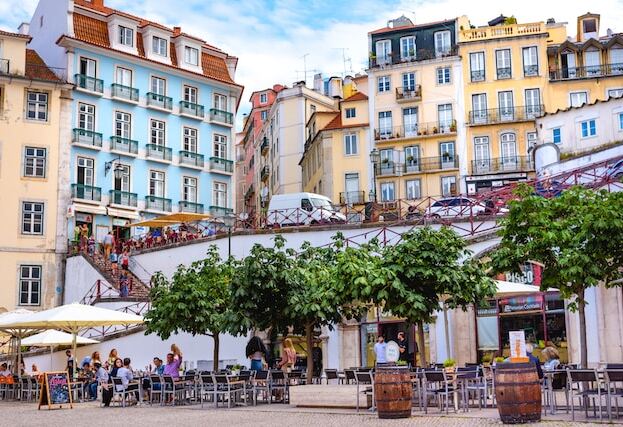
The city’s warm and friendly atmosphere, coupled with a relatively low crime rate, ensures that visitors can explore the local historic neighborhoods, dine at charming cafes, and stroll along the beautiful waterfront with ease. While it’s always wise to take common-sense precautions, such as safeguarding your belongings, Lisbon’s generally safe environment allows you to fully immerse yourself in its vibrant culture, rich history, and diverse neighborhoods, day or night.
As well as its well earned reputation for safety, Lisbon is also regarded as one of the most tolerant cities in Europe. In Lisbon, people are accepted whatever their ethnicity, gender, religion, sexual orientation or social status, with digital nomads, expat families, and Portuguese nationals enjoying equal rights and freedoms in the city.
Living in Lisbon Pros & Cons
Here’s a breakdown of the pros and cons of living in Lisbon.
Advantages:
- Affordable cost of living
- Endless sunshine and mild, pleasant winters
- Geographical proximity to the Atlantic coastline and the breathtaking Tagus river
- Affordable properties for rent or purchasing
- Relatively low cost of living
- Ripe job opportunities
- A growing startup scene
- A blend of nature and city life
Cons:
- The lack of central heating in many Portuguese houses
- Portuguese salaries are low compared to some other Western European countries
- Lisbon rents, particularly in desirable neighborhoods, can be relatively high (this is making it very hard for Portuguese to live in their own city)
- Like in many European cities, dealing with bureaucratic processes in Lisbon can be time-consuming and complex
The Cost of Living in Lisbon
What is the cost of living in Lisbon compared to other European capitals?
The cost of living in Lisbon is considerably cheaper than in other European capital cities such as London, Paris, and Madrid. You can easily get by with €1,200 per month for rent, groceries, and eating out. While the cost of living will always vary depending on your financial situation and spending habits, it’s safe to say that living in Lisbon is pretty affordable, even if it’s becoming somewhat of a trend to live here. If you take into account the ease of travel to Western Europe and the quality of life on offer, living in Lisbon is worth it.
Here’s an overview of the cost of living in Lisbon, Portugal.
Property prices in Lisbon
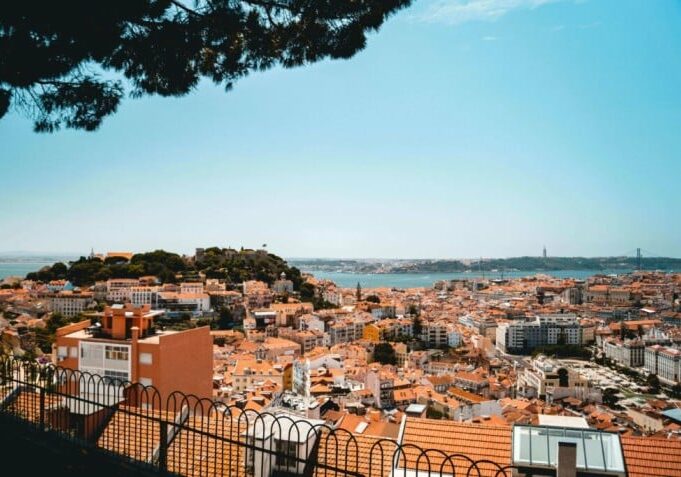
It’s important to acknowledge, though, that buying a property in Lisbon has its downsides. Mainly, there’s a lot of competition from international property investors, so you need to be efficient about snapping up a good property.
Since the real estate market is stable and growing, it’s always a good idea to research properties on offer, compare different prices in the same area, get a feel for the area, and consider enlisting the help of a professional who has your best interests at heart.
If you’re looking for an agent to guide you through the property buying process in Portugal, it could be worthwhile to employ the services of a buyer’s agent. One company offering these services is Goldcrest Advisers.
Accommodation
As in most countries, rent in the capital city is considerably more expensive than in the rurals of Portugal. This can make it a little challenging when you’re looking to find rental apartments, but it’s certainly possible to find a nice place to live without breaking the bank. To give you an idea of the cost of rental apartments in Lisbon, the average monthly rental price for a one bedroom apartment (called a T1) in Lisbon city center is around €1,000. Outside of the city center, the average monthly rent for a one bedroom apartment is €800.
It’s possible to get a studio apartment for slightly cheaper, around €650. A two bedroom apartment will typically cost upwards of €1,2000, and you’d likely need to pay at least €2,000 for a three bedroom apartment.
Food

- Milk (regular, 1 liter): €0,83
- Loaf of Fresh White Bread (125.00 g): €0.36
- White rice (1 kg): €1,20
- Eggs (regular, 12 units): €2,20
- Chicken Fillets (0.15 kg): €1.08
- Apples (1 kg): €1,79
- Banana (1 kg): €1,21
- Tomato (1 kg): €1,99
- Potato (3kg): €2,99
- Onion (1,5 kg): €2,29
- Lettuce (700g): €0,97
Eating out
Eating out in Lisbon is affordable, especially when compared to other major European cities. However, the costs can vary depending on the type of restaurant, location, and your dining preferences.
Lisbon offers a wide range of dining options, from budget-friendly to upscale establishments.
In more traditional Portuguese tascas you can expect to pay €8 to €12 for a meal. This might include a simple sandwich, a traditional Portuguese dish like “bacalhau à Brás” (salted codfish), or a soup.
Coffee or espresso typically costs around €1 to €2. A cappuccino costs between €0.70 and €3, and half a liter of domestic beer costs between €1.50 and €4.
Dining at a mid range restaurant in Lisbon can cost approximately €15 to €30 per person, excluding drinks. For upscale dining experiences in Lisbon’s fine-dining restaurants, you can expect to pay €50 or more per person.
Transportation
You can buy a monthly transportation pass that gives you access to the metro, tram, and bus in the Lisbon metropolitan area. The price of this pass, called “navegante metropolitano” is €40.
A one-way ticket for bus, tram, or metro costs €1.50.
Finding a Job in Lisbon
Can I find a job as an expat in Lisbon?

- Digital media and marketing
- Tech industry
- Tourism
- Start-ups
- International companies
If you’re looking for work, some useful links to check out include:
- Work in Portugal: Jobs in Lisbon
- Finding Work in Lisbon
- Glassdoor Job Openings in Lisbon
- Recruitment Agencies in Lisbon
- Indeed Lisbon Jobs
What is living in Lisbon like for freelancers and remote workers?
Lisbon is fast becoming the ‘it’ destination for remote workers and digital nomads. From its countless hip co-working spaces that are opening left and right across the city to an ever-growing number of digital nomad-friendly cafes, Lisbon is the perfect place for remote workers.
To top it off, you can benefit from generous tax breaks, an efficient system that makes it easy to register as a freelancer, plus the non-habitual resident tax regime, which offers key tax perks to professionals and investors with an independent income.
Is NHR ending?
The State Budget Law for 2024 determined the end of the NHR regime from 1st January 2024. However, certain individuals can still apply up until 31st March 2025, and the scheme is being replaced by the Tax Incentive for Scientific Research and Innovation, which has now been implemented. To learn more, please refer to Is The Portugal NHR Ending?
If you’re worried about feeling lonely as a freelancer in Lisbon, you’ll be pleased to know that there is a large digital nomad community settled here already, with a number of social meetups like the MeetUp Digital Nomad group to keep you company.
Living in Lisbon: Where to actually live
How to find accommodation in Lisbon
When you first arrive in Lisbon, the most popular modes of short-term accommodation are Airbnb and Booking.com. Here you’ll find a vast range of properties on offer for short-term letting. While you fix your temporary living situation, it’s wise to hunt for a good property to rent by using one of the following portals:
- Idealista
- Spot a home
- Uniplaces
- Imovirtual
- Facebook groups
The best neighborhoods in Lisbon
Where to live in Lisbon depends on your lifestyle preferences. Do you prefer quiet neighborhoods or bustling pockets of the cities where you’ll surely never get bored? Are you moving to Lisbon with your family and prefer to be close to a school, or are you a digital nomad looking to live in the hub of the city?
Like every big city in the world, Lisbon has a huge range of neighborhoods, all with unique characteristics. If you like living in the heart of the city center, then Baixa, Restauradores, Alfama, and Graça are your best bet. If you’re into quieter pockets, then Estrela, Campo de Ourique, and areas like Parque das Nações are good options.
Here’s a list of some of the most attractive neighborhoods in Lisbon to live in.
 Alfama
Alfama
Located in central Lisbon, Alfama is the oldest quarter in the city.
Alfama is a charming old neighborhood full of narrow streets, charming alleyways, colorful houses, and, of course, stunning views of Lisbon’s historic quarter and the Tagus River.
 Avenida da Liberdade
Avenida da Liberdade
Avenida da Liberdade is the most commercial area of Lisbon, where you’ll find the majority of embassies, high-end designer shops, and expensive real estate options on offer.
This mile-long strip is within walking distance of most of Lisbon’s most popular attractions, meaning that this area is highly attractive to those wanting to be within close proximity of the city’s most popular attractions.
Bairro Alto
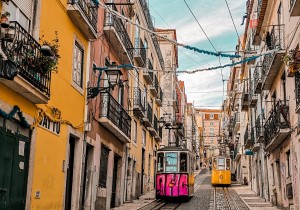
Bairro Alto is made up of countless bars, live music venues, boutique shops, restaurants, and eye-catching street art that perfectly encapsulates the district’s attractive qualities.
With Bairro Alto, there is the possibility for nightlife enthusiasts to truly enjoy living in Lisbon and to feel welcomed into a new community through the shared appreciation of nightlife. Regardless of personal interests, people of all backgrounds can enjoy living in Lisbon and its diverse neighborhoods.
Chiado
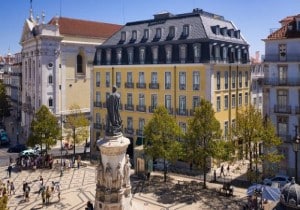
Chiado is served by the Baixa-Chiado metro station (green/blue line), which provides easy access to several other neighborhoods in Lisbon.
The area is also located within walking distance of Lisbon’s top attractions, including Praça do Comércio, the Tagus River, Elevador de Santa Justa, and Convento do Carmo.
Alvalade
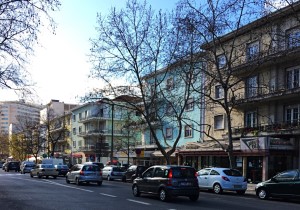
Alvalade boasts tree-lined streets, which provide shade during the hot summer months and create a pleasant ambiance for residents. It’s often considered one of the greenest neighborhoods in Lisbon. One of the area’s most sought-after places is the Jardim do Campo Grande, a large park that provides the ideal backdrop for outdoor activities, picnics, and leisurely strolls.
The neighborhood is well-connected to the rest of Lisbon, with several public transportation options, including bus and metro lines (green line metro stations Roma and Alvalade), making it easy to reach other parts of the city.
This main avenue in Alvalade is a hub of activity featuring various shops, cafes, and restaurants. It’s a great place for shopping and dining, and it’s where you’ll find much of the neighborhood’s commercial life
Príncipe Real
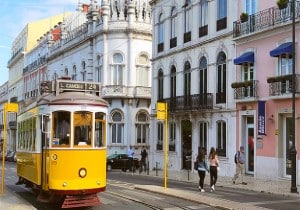
The neighborhood’s centerpiece is the stunning Príncipe Real Garden, a tranquil oasis with century-old cedar trees, walking paths, and a scenic terrace offering panoramic views of the city.
This up-and-coming neighborhood is also known for its vibrant expat community, making it the ideal neighborhood for foreigners seeking to live in Lisbon.
Avenidas Novas
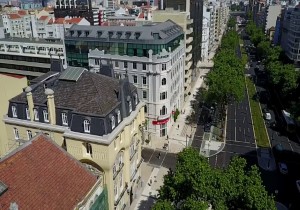
Often considered Lisbon’s premier avenue, Avenida da Liberdade, runs through Avenidas Novas. It’s known for its luxury boutiques, high-end hotels, and upscale restaurants.
Avenidas Novas is also home to the Parque Eduardo VII, an expansive park offering stunning views of Lisbon and the Tagus River. It’s an excellent place for leisurely walks, picnics, and relaxation.
This neighborhood is also home to several cultural institutions, including the Calouste Gulbenkian Museum, as well as some prestigious schools, universities, and business centers.
While it has a bustling commercial scene, Avenidas Novas is primarily a residential area. It attracts a mix of affluent residents, diplomats, and expatriates who appreciate its central location and sophisticated ambiance.
Arroios
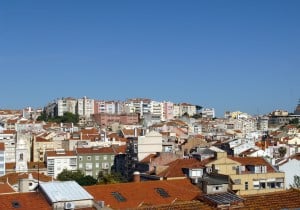
Avenida Almirante Reis is a major avenue that runs through Arroios and is a hub for commerce, dining, and cultural activities. It’s known for its bustling street life and a variety of shops, cafes, and restaurants.
The neighborhood benefits from excellent public transportation links, including multiple metro stations, bus routes, and tram lines, making it easy to access other parts of Lisbon.
Arroios is known for its local markets, including the Mercado de Arroios, where you can find fresh produce, fish, and a variety of goods.
Estrela

The neighborhood is known for harboring the iconic Basilica da Estrela, a beautiful church praised for its impressive baroque architecture and a dome that offers panoramic views of Lisbon. It’s a popular destination for both tourists and locals.
Jardim da Estrela is a beautiful park that surrounds the basilica and is a tranquil oasis in the heart of the neighborhood. It features walking paths, a duck pond, a playground, and shaded areas, making it a favorite spot for picnics and relaxation.
Estrela is characterized by its well-preserved 18th and 19th-century architecture. The neighborhood’s streets are lined with elegant townhouses, many of which have been converted into residences, boutique hotels, or cultural spaces.
Estrela is primarily a residential area, and it’s highly sought after by those looking for a peaceful, upscale living environment. The neighborhood attracts a mix of families, professionals, and expatriates. It also offers a peaceful retreat from the hustle and bustle of central Lisbon while remaining close to all the city’s amenities.
Interesting fact: Arroios and Estrela, in particular, are districts that have gained increased popularity from foreign investors, either wanting to invest or begin living in Lisbon.
Traditionally speaking, the center of Lisbon has always been the major focal point for investors, with places such as Bairro Alto and Avenida da Liberdade often capturing the attention of foreign investors. This trend has shifted, however, in recent years, with Arroios, Estrella, and Baixa offering good value-for-money properties.
Useful Things to Know About Life in Lisbon, Portugal
Public transportation
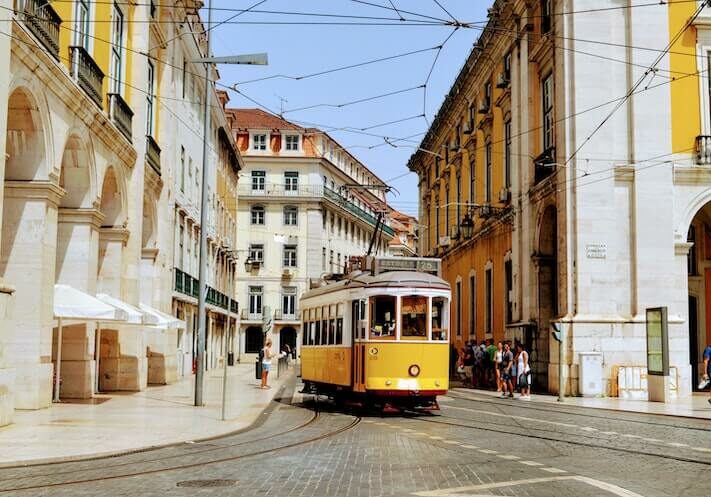
There are many scenic cycle routes that make biking around in the great weather pleasant and easy. Getting to other Portuguese cities is possible by public transport too.
For total freedom when traveling throughout Lisbon, the Viva Lisboa Card is a smart option. Lisboa Viva is the ideal card for frequent users of public transport. It can be topped up with money (‘zapping’) and passes. It is a personal card that can only be used by the respective holder.
Healthcare
Portugal has a good public health service. If you’re really considering moving, it’s also important to know how healthcare for foreigners works in Portugal. If you are or become eligible for Portugal’s national health service, there are some small fees, but generally, it’s an affordable cost. Alternatively, you can opt for private medical insurance. Typically, private health insurance in Portugal costs between €400 and €1,000 per year, depending on how extensive your coverage is.
Schools
If you’re moving to Lisbon with your children, you should do some research into the schooling options. With legal residence in Portugal, you can enroll your children in public schools, but this takes some planning, as there’s quite a lot of paperwork involved. Many expats in Lisbon choose to send their kids to international schools, and Lisbon has plenty of options, including, Oeiras International School, Astoria International School, and the British School of Lisbon.
Opening a bank account in Lisbon
Opening a bank account in Lisbon is a relatively straightforward process. You’ll need a NIF tax identification number, some ID, proof of address (such as a rental contract), and some other documents. You may also be required to deposit €250 to €300. For more details, please see our article on opening a bank account in Portugal.
Taxes in Lisbon
If you live in Lisbon, or anywhere else in Portugal, for more than 183 days of the year, you’ll be considered a tax resident. As such, you’ll need to pay taxes in Portugal. The main one to be aware of is income tax, which is charged at a progressive rate, ranging from 14.5 percent to 48 percent.
Learning the Portuguese langage and useful Portuguese phrases
Living in Lisbon, you will hear the Portuguese language every day. Making the city your home would give you the opportunity to practice and speak with Portuguese people in their language. It’s likely you’ll also come across those who speak Brazilian Portuguese. There are many language schools where you can learn Portuguese, and there several language exchange programs available in the city.
Portuguese is a valuable language to speak as it has a rich history and is widely spoken in many countries. If you’re going to live in Lisbon, it certainly makes sense to learn it. Not to fret, however, if your language skills aren’t up to scratch yet, as most people speak English, you won’t have a hard time getting by.
If you need help to speak Portuguese, bring these useful phrases to Lisbon:
- Obrigado/a (if you’re a man, you use the masculine; if you’re a woman, the feminine) – Thank you
- Bom dia – Good morning
- Tudo bem? – Equivalent to “How are you?”
- Até já – See you later
Things To Do in Lisbon
Beautiful beaches
To get to the beach, you can jump on any train heading from Cais de Sodre to Cascais and jump off at a handful of stops that are coastal-facing. All a short train ride, and there are beautiful beaches at almost every stop. Some of the more popular ones are at Carcavelos and Cascais. You can also head across the river to Caparica or take a short taxi ride to Ericeira if you are looking to catch some waves and surf. Other destinations are Praia de Santo Amaro and Praia de Carcavelos – living in Lisbon, you’ll get to visit each one, choose your favorite, and enjoy life close to the waves!
Nightlife
Head to the bars on Pink Street and then Bairro Alto if you are looking for a cheap drink and a great atmosphere. If you’re more after a dance and a craft cocktail, head to Pensão Amor or Lux. Not to mention, the annual Lisbon carnival, a crazy street party, fills the narrow cobbled streets and lasts half a month, which isn’t to be missed by those living in Lisbon.
Arts and culture
Lisbon has a vibrant arts scene, and it holds many cultural events; it’s also the home city of many renowned and emerging artists. Spend hours in city center museums such as the Berardo Museum of Modern and Contemporary Art, the Museum of Art, Architecture and Technology, and the Calouste Gulbenkian Museum. Not to mention, they offer an opportunity to get away from crowds under the warm weather! Don’t miss Lisbon in November, when Lisboa Arte Bienal, the contemporary art fair, is held. It curates several carefully selected artists from all over the world.
If you love Lisbon outdoors, explore the incredible display of funky and bright street art in the neighborhoods of Alfama and Graca. For a spot of shopping, you’ll find gorgeous fashion in international designer stores, as well as local designers in the city center.
Local cuisine
Food in Portugal is internationally known and sought after in cities all around the world. Lisbon offers delicious food made freshly at street corners. Eat famous pastries such as pastel de nata, the custard tarts that come in a range of flavors, bola de Berlim, a custard-filled doughnut, or pastel de bacalhau, a cod fishcake.
How to make the move to Lisbon as an expat
For EU citizens
If you’re an EU citizen, it’s super easy to move to Lisbon. Once you get here, make sure you register with the authorities in order to legally reside in the country.
For non-EU citizens
Portugal is an amazing country that offers an array of immigration schemes to non-EU citizens.
There are various visa categories, such as work visas, student visas, and family reunification visas, which are appealing especially for UK citizens and Americans moving to Portugal. The specific requirements and application process vary depending on the type of visa you’re applying for.
Here’s an overview of some of the most popular visa categories for non-EU citizens seeking to live in Lisbon.
Portugal Golden Visa Program
This scheme rewards investors with legal residency in exchange for investing in the country. You can pick from a handful of investments, such as art and cultural donations and investing in the Golden Visa investment funds.
To find out more about the Portugal Golden Visa, visit our ultimate guide.
D7 Visa Portugal
The D7 Visa is designed for financially independent individuals, including retirees, who have a passive income and plan to stay in Portugal permanently. To be eligible, you must prove that you have a minimum monthly income of €820 (Portugal’s minimum wage).
D3 Visa Portugal
The D3 Visa (Highly Qualified Activity Permit) was designed to attract highly qualified workers to the country. It’s issued for professionals who already have confirmed employment opportunities or a self-employed contract to provide services to a Portuguese company.
D2 Visa Portugal
Also known as the Entrepreneur Visa, the D2 Visa was created by the Portuguese government to raise external resources and investments to boost the country’s economy.
This visa is intended for foreigners who want to either start a new business in Portugal or extend their existing business to the country. Holders of this temporary stay visa can also choose to invest in an existing business in Portugal. It’s ideal for freelancers, entrepreneurs, and independent service providers.
Digital Nomad Visa
In October 2022, Portugal introduced the new Digital Nomad Visa (D8 Visa), designed for foreigners who live and work in Portugal as remote workers. It’s ideal for remote workers who have a monthly income that is four times the Portuguese minimum wage. This means you need contracts or work agreements that total at least €3,280 per month, which is around $3,495 per month, in order to be eligible.
Whatever route to residency you pick, it’s important to read up on each program’s requirements first and to thoroughly research which will work for you.
Living in Lisbon: How We Can Help You
With over 50 years of experience in immigration, law, and investment, Global Citizen Solutions delivers unmatched guidance for moving to Portugal.
Our multi-skilled team, with experience in immigration, law, and investment, will ensure your visa application is successful by managing the process from start to finish.
Global Citizen Solutions also reduces the hassle and stress of attaining your visa. The process is bolstered by our innovative Be System®, providing real-time visa updates, and our trusted lawyers ensure your application goes through smoothly.
With a singular point of contact, we navigate the entire process, handling Portuguese bureaucracy and legal matters and providing you with the residency option most suited to your needs.
Aside from meticulous visa application management, Global Citizen Solutions has a locally rooted real estate division, providing a seamless transition to your new home.
Let us understand your aspirations and guide you toward realizing your goal of becoming a global citizen. Contact us today for a free consultation.
Frequently Asked Questions about Living in Lisbon
What is living in Lisbon like?
There’s a reason why expats are coming in droves to live in Lisbon and why there’s already such a huge expat community here. Living in Lisbon is, in no uncertain terms, amazing. Unlike most European cities, the climate is excellent, where you’ll get around 9 or 10 months of fantastic weather per year. The city is big enough to never get bored but small enough to provide a sense of peace and tranquility. You’re close enough to the coastline and Tagus River, so frequent walks by the waterfront are a very real possibility. The living costs are relatively affordable, and the crime rate is very low.
Is it expensive to live in Lisbon?
From groceries eating out, to utility bills and rent, living in Lisbon is pretty affordable. In fact, as a single person, you can comfortably get by with around €1,200 per month. Not to mention, if you have a bit more to spare and an itch to travel, you’re in a great location to access cheap flights to other European countries.
Where should I live in Lisbon?
The most popular neighborhoods to live in Lisbon include Alfama, Graca, Anjos, Estrela, Principe Real, Baixa, Avenida, and Campo de Ourique. You’ll find rental apartments, Airbnb, hotels, and investment properties in all the major villages.
Can a foreigner buy a property in Portugal?
If you’re considering living in Lisbon, you might want to consider buying a property. Not only is the Lisbon real estate market flourishing, but it also offers a potential return on your investment, thanks to its booming tourist industry. Thankfully, there are no restrictions to buying a home in Portugal as a foreigner.
Which neighborhoods are the most up-and-coming in Lisbon?
There are many areas in Lisbon that attract expatriates to invest in property, the three most popular being Misericórdia, Santa Maria Maior, and Santo António.
There are, however, alternative neighborhoods like Anjos, Intendente, and Lapa that are now emerging as attractive hotspots to investors as they gain popularity due to the renovation efforts in these areas.
What are the pros and cons of living in Lisbon, Portugal?
Living in Lisbon has a range of advantages, including its temperate climate, rich cultural scene, captivating architectural heritage, delectable cuisine, and warm and welcoming locals. However, there are cons, such as expensive rents and limited employment opportunities.
What are the cons of living in Portugal?
Living in Portugal certainly has its perks, but there are some cons to consider as well. One significant drawback is the relatively low average income, which can make it challenging for expatriates to maintain a high standard of living, especially in major cities like Lisbon and Porto, where the cost of living has been steadily rising. Portugal’s bureaucracy can be cumbersome and slow, making administrative tasks more time-consuming.
Can you live in Lisbon with only English?
While it is possible to live in Lisbon with only English, it’s advisable to learn at least some basic Portuguese to help with everyday communication and to make your daily life more convenient.
Is Lisbon expat-friendly?
Lisbon is often regarded as an expat-friendly city for several reasons. It boasts a growing expatriate community, with many locals proficient in English, making communication easier for newcomers. The city offers a relatively affordable cost of living compared to other European capitals, along with a high quality of life, a pleasant climate, and a rich cultural scene. Safety is generally not a major concern, and the healthcare system is well-regarded.
Why is everyone moving to Lisbon?
Lisbon has been a magnet for people from around the world in recent years, drawing a growing number of expatriates and digital nomads. Several factors contribute to this trend. First and foremost is the city’s high quality of life, characterized by its mild Mediterranean climate, beautiful architecture, and relaxed pace of living. Lisbon also offers a relatively affordable cost of living compared to other European capitals, making it an attractive option for those seeking a European lifestyle without breaking the bank. The presence of a vibrant expatriate community, coupled with a welcoming and open-minded local population, fosters a sense of belonging.
Is Lisbon a good place to live?
Lisbon provides a high quality of life for expats, thanks to its pleasant weather, green spaces, cultural richness, and varied culinary scene, along with a large expat community. That said, as with any relocation abroad, there will be both pros and cons to consider before moving to Lisbon in 2024.
How would moving to Lisbon affect how I pay tax?
Living in Lisbon as an expat means you could pay income tax on all your worldwide income, not just what you earn in Portugal. The tax rate would be progressive, increasing as you earn more.
How can I learn Portuguese in Lisbon?
In Lisbon, there are many language schools and language exchange programs that can help you learn to speak Portuguese. While you don’t need to speak Portuguese fluently to live in Lisbon, it can be helpful when getting day-to-day tasks done, and it can enrich your experience of living in Portugal.


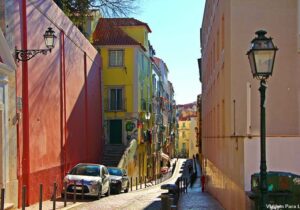 Alfama
Alfama Avenida da Liberdade
Avenida da Liberdade







